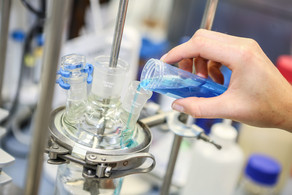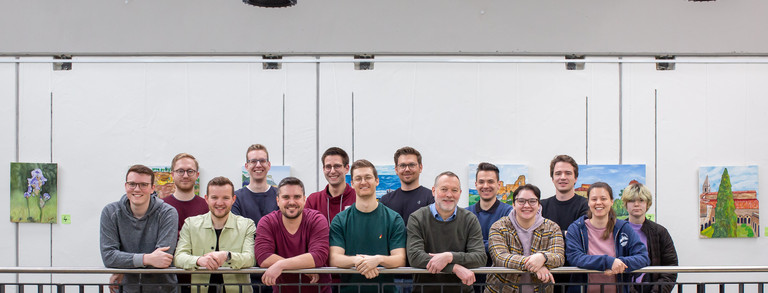M. Sc. Thomas Roth
Focus of work
- Multiphase homogeneous catalysis
- Utilization of renewables
- Hydroformylation/Hydroaminomethylation
- Upscaling of novel processes to a continuous miniplant scale
Follow the link to moodle to get further information about current student research projects:
Curriculum Vitae
Thomas Roth studied chemical engineering at TU Dortmund since October 2013. During this time he gained industrial work experience through a internship at Lanxess AG in Krefeld Uerdingen and finished his bachelor thesis with the topic "Construction and calibration of an IR camera for non-invasive temperature measurement at microreactors" in the research group of Prof. Dr. Kockmann. In 2020 he earned his master's degree with the work "Investigation of hydroaminomethylation in the thermomorphic multiphase system on a continuous miniplant scale" under the supervision of Prof. Dr. Vogt. Since June 2020 Thomas works as a research associate at the Laboratory of Industrial Chemistry at TU Dortmund.
Research Topic
Homogeneous transition metal catalysts offer many strengths over heterogeneous catalysts, including high catalyst activity and selectivity even at comparatively mild operating conditions. Despite these advantages, most industrial processes are catalyzed heterogeneously due to the easier and thus more cost-effective separation. Since recycling of the transition metals is indispensable for the economic and ecological sustainability of processes using homogeneous catalysts, the development of efficient separation and recycling concepts is required to make use of their strengths.
The immobilization of the catalyst in multiphase systems offers a promising approach in this respect, as the catalyst phase can be separated and recycled with relatively low effort. However, this approach also poses certain challenges, such as mass transport limitations across the phase interface. Therefore, this research will investigate and optimize different intensification strategies of continuous processes using aqueous multiphase systems for homogeneously catalyzed carbonylation reactions (Fig. 1). In each case, the product phase is separated from the catalyst phase in a decanter, allowing the latter to be recycled to the reactor (Fig. 2).

The first strategy is the improvement of the mixing and thus the enlargement of the phase interface by using the innovative jetloop reactor (Fig. 2, left). In the second strategy, cyclodextrins are used as phase transfer agents to improve the contacting of the catalyst with substrate molecules at the phase interface (Fig. 2, right).

Publications & Conferences
-
Roth T. F. H., Averbeck, T., Daalmann, M., Vogt, D., Seidensticker, T., (2025) "Continuous Production of Bifunctional Platform Chemicals From Plant Oils in Water by Cyclodextrin-Mediated Hydroformylation" ChemSusChem, e202402421 DOI: 10.1002/cssc.202402421
-
Roth, T. F. H., Spiekermann, M. L., Lütkenhaus, D., Niefer, F., Vogt, D., Seidensticker, T., (2024) "The effect of polyunsaturation – insights into the hydroformylation of oleochemicals" Catal. Sci. Technol., 2024, 14, 5551-5558. DOI: 10.1039/D4CY00839A
-
Ferreira, M., Bricout, H., Roth, T. F.H., Seidensticker, T., Tilloy, S., Monflier, E., (2024) "Aqueous biphasic hydroformylation and hydroaminomethylation assisted by cyclodextrins: From benchtop to industrial perspective" Catal. Today, 442, 113951, DOI: 10.1016/j.cattod.2024.114951
-
Roth, T. F.H., Häusler, M., Vogt, D., Seidensticker, T., (2024) "Advancing the aqueous biphasic hydroformylation of oleochemicals in the loop: Continuous reaction and separation using a jet-loop reactor concept" Catal. Today, 439, 114803, DOI: 10.1016/j.cattod.2024.114803
- Hares, K., Wegener, H. W., Roth, T. F. H., Reichert, R., Vogt, D., Seidensticker, T., (2024) "Primary amines from alkenes and carbonyl compounds: highly selective hydrogenation of oximes using a homogeneous Ru-catalyst" Catal. Sci. Technol., Advance Article, DOI: 10.1039/D4CY00368C.
- Roth, T. F. H., Kühl, A., Spiekermann, M. L., Wegener, H. W., Seidensticker,T. (2024) "Biodiesel as a Sustainable Platform Chemical Enabled by Selective Partial Hydrogenation: Compounds Outplace Combustion?!",ChemSusChem, e202400036 DOI: 10.1002/cssc.202400036.
- Roth, T., Evertz, R., Kopplin, N., Tilloy, S., Monflier, E., Vogt, D., Seidensticker, T., (2023) "Continuous production of amines directly from alkenes via cyclodextrin-mediated hydroaminomethylation using only water as the solvent" Green Chem., 25, 3680-3691, DOI: 10.1039/D2GC04847G
- Schlüter, S. , Kühnemann, K. U. , Freis, M. , Roth, T. , Vogt, D. , Dreimann, J. M. , Skiborowski (2021). "Continuous co-product separation by organic solvent nanofiltration for the hydroaminomethylation in a thermomorphic multiphase system". Chem. Eng. J. 409, 128219, DOI: 10.1016/j.cej.2020.128219.
Talks:
- November 2023, Dresden, DGMK C1 Building Blocks for Future Chemistry, “Continuous processes for the Rh-catalyzed carbonylation of olefins and unsaturated esters enabled by cyclodextrin-mediated aqueous biphasic systems”
- May 2024, Würzburg, Annual Meeting on Reaction Engineering and Electrochemical Processes 2024, “Advancing multiphase catalysis for efficient recycling of homogeneous catalysts in continuous operation”
- June 2024, Dortmund, 12th workshop on fats and oils as Renewable Feedstock for the Chemical Industry, “For a World That's Bright, Use the Biodiesel Right, Don't Ignite – A Renewable Platform Chemical enabled by partial hydrogenation”
Poster:
- June 2021, Weimar, 54. Jahrestreffen Deutscher Katalytiker, “ Intensification strategies for homogeneously catalyzed carbonylation reactions in aqueous multiphase systems: Utilizing the "chaos"”
- May 2022, Dortmund, 11th workshop on fats and oils as Renewable Feedstock for the Chemical Industry, “Intensification strategies for homogeneously catalyzed hydroformylation of oleo chemicals in aqueous multiphase systems: Utilizing the "chaos"”
- July 2022, Lissabon, XXII International Symposium on Homogeneous Catalysis, “Cyclodextrins as an intensification strategy for homogeneously catalyzed carbonylation reactions in aqueous multiphase systems”
- June 2022, Weimar, 55. Jahrestreffen Deutscher Katalytiker, „ Cyclodextrins as an intensification strategy for homogeneously catalyzed carbonylation reactions in aqueous multiphase systems”
- June 2024, Weimar, 57. Jahrestreffen Deutscher Katalytiker, „Continuous Processes for the Rh-catalyzed Hydroformylation of Renewables in Aqueous Biphasic Systems”





